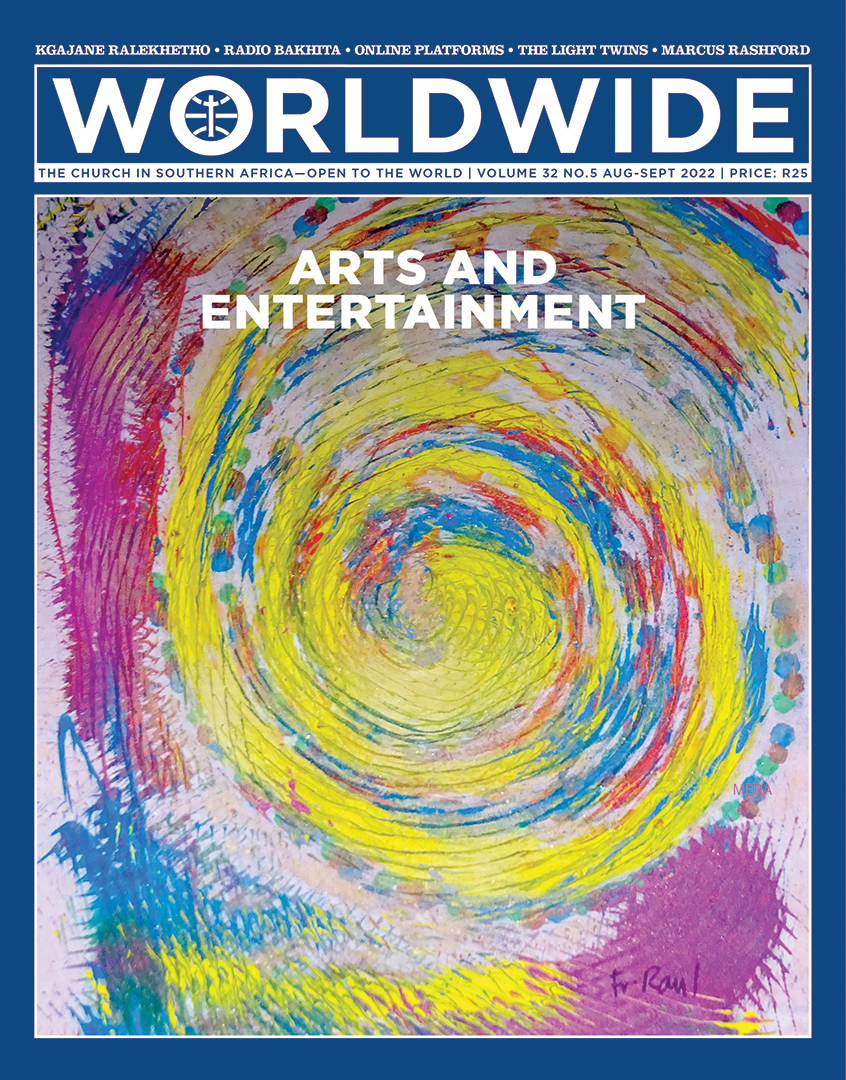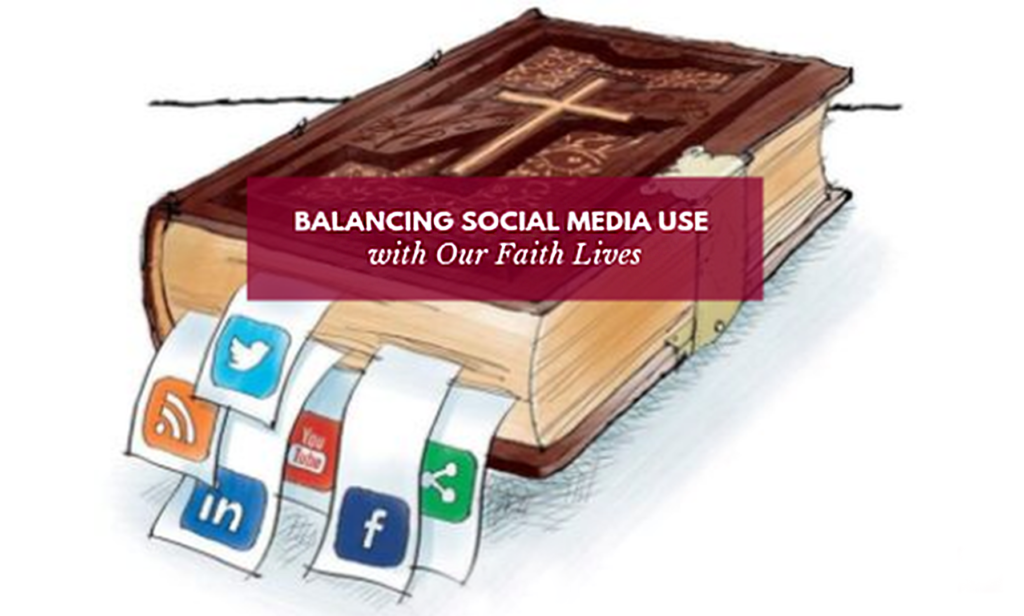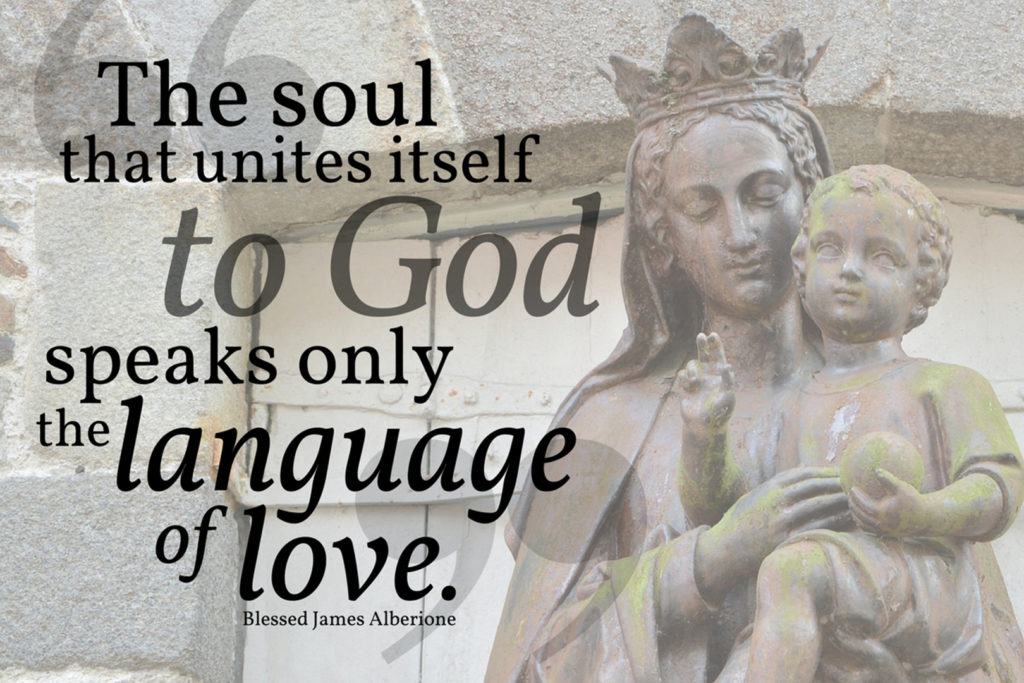
ARTS AND ENTERTAINMENT MERA
This painting represents the turmoil experienced during a time of crisis. Typhoon is a symbol of anxiety, chaos, destruction and struggle. However, once those trial moments are surmounted, the inner energy of the typhoon brings transformation, putting life in order and strengthening one’s spirit. Emotional typhoon
seems to tear life apart when it hits. One can’t turn away from it, but once it is over, it brings new potential; visions become clear and one sees brighter days ahead.
SPECIAL REPORT • online choices

Igniting your faith with mindful media use
Media can be a powerful tool for encountering Christ and communicating His values
to an extended audience. In order to be such an instrument, a Spirit-guided process
of discernment and choices becomes crucial
BY Sr Neville Christine Forchap | Daughters of St Paul (FSP), Johannesburg
Does your media use ignite or quench the fire of your faith? Do your prayers embrace the realities of the world presented by the media channels you visit? Navigating the incredible evangelization potential of the media while avoiding the dangers can be quite challenging. We all need formation for it and criteria to discern what the best online choices are for us. In the Church we find teachings, prayers, and examples of the holy lives lived by role models such as St Paul, St Brigit, St Francis de Sales, Blessed James Alberione, and Blessed Carlo Acutis, which can help us to engage in media usage mindfully and effectively.
Human beings are created in the image and likeness of the Trinitarian God; the communion of persons: Father, Son, and Holy Spirit. Our humanity and faith call us into a relationship with God and with each other. True communication—the giving of self in love (O’Connor & Ferrari-Toniolo 1971: 11)—fosters communion in those relationships. Our mobile apps, favourite TV programmes, books, and conversations can either build up those relationships, or break them down. Therefore, we can ask ourselves, what is the relationship between our use of the media and our faith?
Today, social media gives most people the privilege and responsibility to be content creators
A follower of Christ is attentive to God’s presence in each person, experience, and situation. This awareness requires sacramental imagination. Media content has the potential to awaken that imagination, calling us back to God and to the service of our brothers and sisters. However, this demands integration of faith and life, rather than a compartmentalization of lives, which hinders seeing Grace at work in the culture.
Media as gifts from God
Vatican Council II broadened the ways in which the Church relates to the world. The Decree on the Media of social communications (Pope Paul VI 1963), highlights the potential of the media. “Among the wonderful technological discoveries which persons of talent, especially in the present era, have made with God’s help, the Church welcomes and promotes with special interest those which have a most direct relation to human’s minds and which have uncovered new avenues of communicating most readily news, views and teachings of every sort” (Pope Paul VI 1963: 1).

We need eyes of faith to perceive God’s presence in every situation, be it a war, pandemic or natural disaster
Pope Paul VI and subsequent popes’ documents and World Communications Day (WCD) messages have encouraged the Church to enter into the New Areopagus of the culture of communications, to proclaim Christ and promote the common good. In his 2014 WCD message, Pope Francis described internet as a gift from God. He has often spoken of the potential of social networks in fostering solidarity, as
a means of evangelization, and a contributing factor in human development. The Church also acknowledges that the media
can be, and are, misused for evil purposes.
A moral responsibility
Pope John Paul II stated, “The media can be used to proclaim the Gospel or reduce it to silence in human hearts” (Foley & Pastore 1992: 4). These words highlight the power of choice and the meaning of
our responsibility. We can ask ourselves, what are we doing or failing to do to bring the light of God’s Word to others through the many available means?

In the past, the responsibility to produce and share wholesome content fell mainly upon writers, actors, producers, and distributors. Today, social media gives most people the privilege and responsibility to be content creators. Our posts, tweets, blogs, and podcasts go beyond
familiar circles. We all have a moral responsibility to choose and promote what is true, good, and beautiful. A media mindfulness strategy developed by Sr Gretchen Hailer (2007), proposes four considerations when discerning the value of media content:
• Consider what you are seeing or hearing.
• Be aware of who is being targeted and what is being sold.
• Notice the Christian values, morals, or social issues that are being supported or ignored.
• Reflect on the appropriate personal or group response.
Three spiritual practices for a mindful online presence
- Examination of conscience Our consciences need to be formed and examined daily, helping us make the right decisions and assume responsibility for our media choices. We prayerfully review our thoughts, words, and actions, and consider how we have hurt our relationship with God, self, and others. This practice helps us see God at work in our lives. It fosters gratitude and the resolve to live according to God’s will. Daily examination of conscience facilitates a mindful and contemplative life online and offline.
- Praying the news
Every day we hear news from family, friends, communities and from the world. The amount of information we receive can be overwhelming and make us lose our Christian sensitivity to the cries of our brothers and sisters.
I learned to “pray the news” when I joined the Daughters of St Paul, a religious congregation founded in 1915 by Blessed James Alberione and Venerable Mother Tecla Merlo in Italy. We are called to communicate the Gospel through our lives and all available forms of media. Our Sisters often bring to prayer the stories, names, and faces that strike them during the news. We share and reflect on current events in the light of God’s Word.
News does not end when the anchor signs off or when we close our browsers. God has something more to say about what is happening in our countries and the world. It may not always come naturally to ask Jesus what he thinks about a situation. Sometimes we are stuck in the anxiety provoked by bad news. Other times, we forget to celebrate good happenings with the Lord. Bringing the news to the Lord in our prayer takes grace and practice, but it is fruitful, especially when we can bring these intentions to Holy Mass and Eucharistic adoration.
We need eyes of faith to perceive God’s presence in every situation, be it a war, pandemic or natural disaster. We need hope to dispel discouragement and despair. We definitely need Christ and His love in the world. Our faith trusts that we live under the loving and merciful gaze of our heavenly Father. God knows the truth about each person and situation and the Holy Spirit purifies our minds to see the truth and expands our hearts to love more deeply. - Reparation
Reparation for our sins and the sins of others is part of the Catholic tradition. We offer something good in place of evil or of what is missing, as an act of love for God whose love is ignored or rejected. The digital era has seen a proliferation of information and entertainment content, both good and bad. Pornography, cyberbullying, human trafficking, gambling, and scamming are some online dangers. Prudence and critical judgment when using the Internet can be invaluable. Christians are called to work and pray for good use of the media and for reparation for its misuse.
St Paul the apostle engaged fully with the cultures of his time. He guides us by his example and words, “Finally, brothers and sisters, whatever is true, whatever is honourable, whatever is just, whatever is pure, whatever is pleasing, whatever is commendable, if there is any excellence, and if there is anything worthy of praise, think about these things” (Phil 4: 8). May the Holy Spirit animate us so that our media usage will brilliantly and boldly ignite faith in Christ as the Way, the Truth, and the Life.
| Dates To Remember |
|
August 9 – Women’s Day in South Africa 9 – International Day of the World’s Indigenous Peoples 12 – International Youth Day 21 – The Assumption of the Virgin Mother 21 – International Day of Remembrance and Tribute to the Victims of Terrorism 22 – International Day Commemorating the Victims of Religion or Belief Violence 23 – International Day for the Remembrance of the Slave Trade and Its Abolition 24 – Heritage Day in South Africa 29 – International Day against Nuclear Tests 31 – International Day for People of African Descent September 5 – International Day of Charity 7 – International Day of Clean Air for Blue Skies 8 – International Literacy Day 9 – St Peter Claver, patron of the missions 9 – International Day to Protect Education from Attack 12 – United Nations Day for South-South Co-operation 15 – International Day of Democracy 18 – International Equal Pay Day 21 – International Day of Peace 23 – International Day of Sign Languages 25 – World day of Prayer for migrants and refugees 26 – International Day for the Total Elimination of nuclear weapons 27 – World Tourism Day 28 – International Day for Universal Access to Information 29 – International Day of Awareness of Food Loss and Waste 30 – World Maritime Day |
